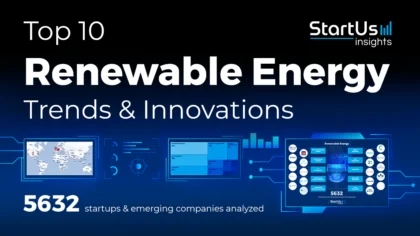In the traditional model, energy is produced in a large grid and is consumed directly by the end-users. However, as the smart grid expands, the landscape is dramatically changing. Smaller grids and distributed energy resources (DERs) generate energy that they can transmit back to the larger grid or store for later use. Businesses and residences are producing increasing amounts of energy via renewable sources, primarily solar. This necessitates developments in battery technology to advance energy storage and the profitability of DERs. There is a wide range of technologies for energy storage, including batteries, thermal, mechanical, hydrogen, and pumped hydropower storage.
Electric vehicles (EVs), a prominent use case for energy storage, also aim to reduce the emission of greenhouse gases but suffer from poor batteries. More efficient batteries and more robust charging infrastructure are bound to increase their adoption. Other than DERs, the EV market is likely the most prominent and upcoming use for energy storage.
Top 5 Global Startup Hubs: Energy Storage
Using our StartUs Insights Platform, we analyzed the geographic distribution of global activity in storage in energy. We identified 25 regional hubs* that observe high activity in developing energy storage solutions.
According to our data, Silicon Valley, London, New York City, Boston, and Los Angeles are home to 455 startups* and emerging companies and account for 25% of global startup activity. Let us have a look at some of the energy storage startups from these 5 top hubs.
According to our data, slightly over four-fifths of all activity in energy storage occurs in North America and in Europe. Novel use cases for storage combined with hubs for innovations in the energy sector create ideal conditions for the technology to reinvent energy consumption and distribution and disrupt related industries as well.
Even though the rest of the world sees comparatively lower activity, Canada, Germany, and Australia are home to a significant number of energy storage solutions. As the smarter grid expands to newer territories, the demand for energy storage solutions for DERs and EVs is set to increase significantly.
1. Silicon Valley: 164 Startups
San Francisco’s Solar + Storage for Resiliency project aims to expand the solar market and integrate solar and energy storage. As tech giants, such as Amazon, Facebook, Google, and Apple, look to power a large part or all of their global operations from renewable sources, they are investing in the growth of energy storage. Going beyond big companies, startups are also driving innovations in the space.
Exergy Energy is a Berkeley-based distributed energy supplier. They install renewable and battery storage solutions, at their own expense, for facilities either on-site or off-site. It combines solar and wind generation during day and night for energy generation and backup. Their solution allows their customers to be energy resilient and meet all of their energy requirements from renewable sources.
2. London: 99 Startups
As businesses and residences adopt the smart grid, better energy storage technologies demand advancements in energy storage for a carbon-neutral future. The Low Carbon Network Fund (LCNF) from Ofgem, the government regulator for gas and electricity markets in the UK, supports projects that advance renewables, including energy storage.
London-based startup Zenobe Energy offers energy storage solutions for grid operators and businesses. The company’s software and hardware capabilities connect its batteries with the national grid. It allows network infrastructure companies to deploy at least 50MW from Zenobe’s storage assets within seconds. The startup also offers solutions for industrial units and electric vehicle fleets.
3. New York City: 90 Startups
In 2018, the New York Public Service Commission issued an energy storage order that establishes an energy storage goal of 3.000 MW by 2030. It is imperative to meet the city’s ambitious goal of fulfilling 50% of its electricity needs from renewables within the next decade. New York is one of the best cities to own an electric vehicle in and innovations in battery capacity are underway to further increase their adoption.
StorEn Technology is a New York-based startup that develops vanadium flow batteries for efficient energy storage. The benefits of the company’s batteries include a reduction in power costs, an increase in battery capacity, and improved reliability. They offer a 30 kWh all-in-one module in indoor and underground versions, and a 500 kWh module for businesses.
4. Boston: 115 Startups
The state of Massachusetts qualifies behind-the-meter systems and solar-plus-storage systems for energy efficiency incentives and net metering. In particular, the commercial real estate in the city stands to benefit from energy storage investments as it competes with San Francisco and New York City. The area also houses top universities, such as the Massachusetts Institute of Technology (MIT) and Harvard University, with dedicated initiatives to advance research in energy storage.
Boston-based startup Malta offers electro-thermal energy storage solutions that collect and store energy from both renewable sources and fossil fuels. It converts the electricity generated into heat and stores it in molten salt, to be converted and sent back to the grid when needed. Their solution stores energy for 6+ hours and promises a lifetime of 20+ years. By allowing energy to be stored for later use, their technology removes the bottleneck in the distribution and transmission of electricity.
5. Los Angeles: 49 Startups
Los Angeles benefits from a confluence of its emerging tech scene and California’s aggressive energy storage mandates. Recently, the LA Department of Water and Power contracted the Eland project to supply power for low-cost solar and storage. The city also has a strong presence of electric vehicle infrastructure that could greatly benefit from progress in energy storage.
ReJoule is a Los Angeles-based startup that offers a battery management system to maximize battery value. Their solution monitors the health and performance of large-format lithium batteries and uses the data to enhance their performance. It enables real-time diagnostics to manage batteries in EVs safer and longer-lasting, as well as assesses residual value for second-life applications.
What’s Next?
Advancements in energy storage will have significant implications for the adoption of renewable energy and electric vehicles. These technologies are crucial to reduce the dependence on fossil fuels and shift to a zero-carbon economy. Improvements in the capacity and lifetime of batteries are necessary to realize this goal.
*A hub is defined as the regional geographic center of activity for this topic. It covers the center point with a radius of 100km. We define startups and emerging companies as those founded after 2010.


![Dive into the Top 10 Energy Industry Trends and Innovations [2025]](https://www.startus-insights.com/wp-content/uploads/2025/03/Energy-Trend-SharedImg-StartUs-Insights-noresize-420x236.webp)






